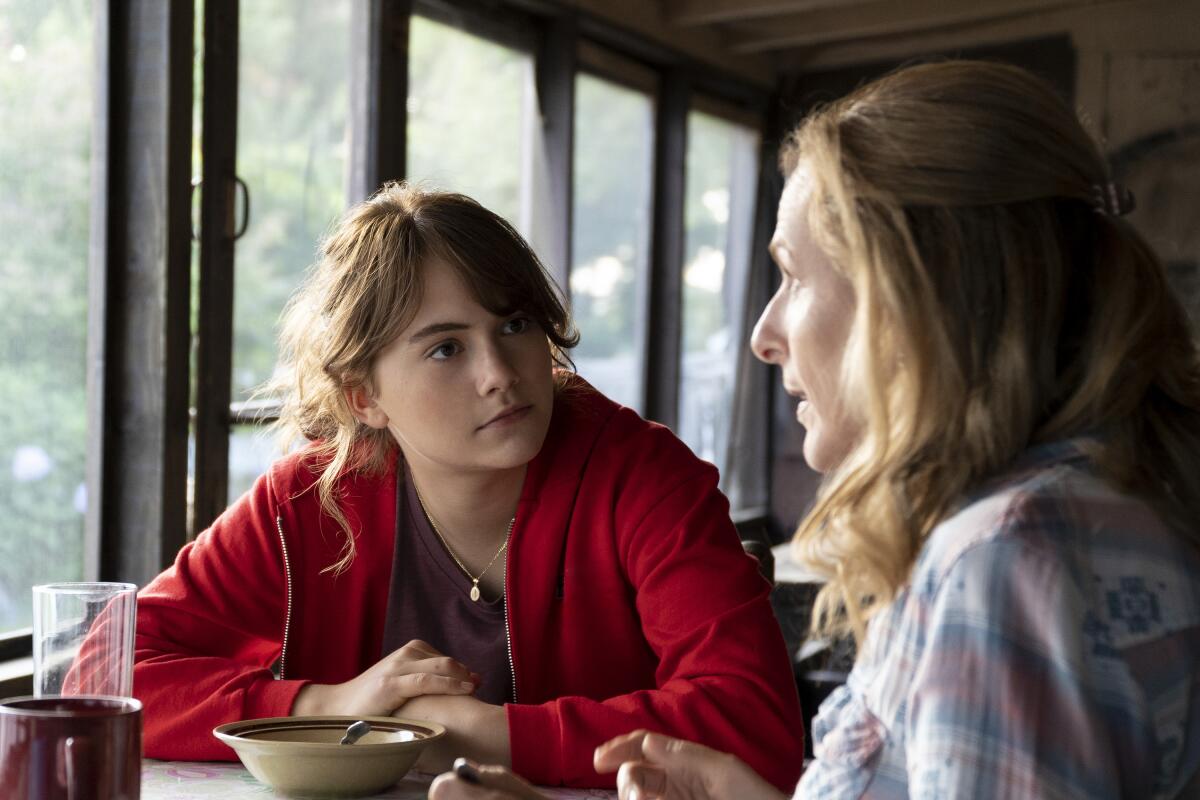Apple TV+’s journey from Hollywood outsider to first streamer with a best picture Oscar

It was only three years ago when Hollywood was looking at Apple with intense skepticism.
Before launching its streaming service Apple TV+ in late 2019, the iPhone maker had confused traditional film and television industry players with a presentation that was heavy on star power — Oprah Winfrey, Steven Spielberg plus a Sara Bareilles musical performance — and light on actual programming.
To some filmmakers and agents, the Cupertino, Calif., tech giant’s seemingly cautious approach to content exposed a culture clash between entertainment and Silicon Valley — one that seemed as if it would hinder the company’s ability to compete with Netflix and Walt Disney Co.’s Disney+. Now with a best picture Oscar in hand for Sian Heder’s family drama “CODA,” Apple can wave gold-plated hardware in the face of its critics. The Academy of Motion Picture Arts and Sciences bestowed Apple with its highest achievement, making it the first streaming company to take best picture.
Apple beat Netflix to the punch.

Siân Heder’s scrappy, jugular-piercing crowd-pleaser about a hearing teenager growing up within a Deaf family upsets Jane Campion’s brooding psychological drama, the clear-cut, pre-Oscars favorite for best picture.
Netflix has spent tens of millions of dollars campaigning for Oscars over the last few years, winning key awards, including Alfonso Cuaron’s directing achievement for “Roma,” and securing seven best picture nods, all still without nabbing the cherished top statuette. Apple did it with its first best picture nominee, a small, quiet indie film it acquired at the 2021 Sundance Film Festival for a record-breaking $25 million.
Congratulating the filmmakers and cast, Apple Chief Executive Tim Cook tweeted, “Team CODA created a profoundly beautiful movie, a story of hope and heart that celebrates our differences.”
Daniel Ives, a managing director at Wedbush Securities, called the best picture win a “game changer” for Apple TV+, and said the win will help encourage more talent to work with the streamer as it takes on its rivals. Still, Netflix, Amazon Prime and Disney+ are far ahead of Apple in terms of subscribers, which is the metric that really matters.
“They’ve been waiting for validation of the platform and ultimately the awards,” Ives said. “It’s a huge validation, not just from a talent perspective, but especially when it comes to consumers.”
The Apple TV+ subscriber base remains small — with an estimated 25 million paid customers — considering there are 975 million active iPhones in the market, Ives said. Apple doesn’t release subscriber numbers for its video streaming business, which charges a modest $5 a month. For comparison, about 222 million people subscribe to Netflix globally. Netflix’s standard plan costs $15.50.
From the Oscars going back to Sundance, why ‘CODA’ was always something special.
Both Netflix and Amazon have broadened their film strategies in recent years to focus on releasing more popular movies, rather than just chasing critical acclaim. Netflix has put out several blockbuster-like movies with marquee-busting casts, such as “Red Notice” and “The Adam Project.”
The Apple streamer, meant to expand the company’s revenue in subscriptions under its larger services business, opened with just nine programs in 2019. The shows received mixed reviews, though “The Morning Show” and “Dickinson” earned early devotees.
Since then, Apple’s TV programming has expanded and earned accolades, especially the hit comedy “Ted Lasso,” which amassed an impressive seven Emmys last year. The new psychological thriller series “Severance,” directed by Ben Stiller, has earned widespread praise from critics, signaling Apple’s ambitions in the space.
Its original film unit has been slower to gain traction. It put out movies such as Sofia Coppola’s “On the Rocks,” the Tom Holland crime drama “Cherry” and the Tom Hanks sci-fi film “Finch,” but nothing has made much of a splash in mainstream culture.
“CODA’s” win marks a breakthrough. The film is about a deaf family who relies on their only hearing member, Ruby, to interpret for them and help them navigate their way through the fishing community in Gloucester, Mass. But Ruby has aspirations of her own to pursue a music career.
“CODA” won all three awards for which it was nominated, with Troy Kotsur recognized as supporting actor and Heder winning for adapted screenplay. Kotsur is the first deaf male to win an acting Oscar. Apple was also nominated in three categories for Joel Coen’s “The Tragedy of Macbeth,” starring Denzel Washington, who was up for lead actor.
Among the best picture nominees, “CODA” saw the largest percentage increase in viewership post-nominations, according to data from Samba TV, which measures streaming viewing. Nearly 40% of “CODA’s” lifetime streaming viewership occurred after the nominations were announced. The average of the others — excluding “Nightmare Alley,” which was released on streaming in February — was 15%, the firm said.
“It’s a new kid in the block relative to streaming. Many within the Hollywood elite always viewed Apple as kind of an outsider and never really took its content effort seriously,” Ives said. “It would be viewed as a groundbreaking achievement for Apple where I think many within Hollywood never thought Apple would get within a sniff of the Academy Award ceremony.”
Apple makes most of its revenue through the iPhone. Apple TV+ is part of a growing revenue category for Apple called services, which also includes other subscriptions such as access to news and music streaming.
The services division, part of a strategy that keeps Apple users loyal to the company’s products, generated $19.5 billion in revenue during its 2022 fiscal first quarter, or 16% of the company’s sales.
Ives estimates that Apple spends roughly $7 billion a year on streaming video content, which is far less than the estimated $19 billion Netflix is expected to deploy on programming this year. Apple is readying some big swings in film, agreeing to finance Martin Scorsese’s adaptation of “Killers of the Flower Moon,” a vehicle for Leonardo DiCaprio that is said to have a budget of some $200 million.
Compared with the Scorsese drama, “CODA” was a steal. The movie reportedly cost less than $10 million to produce, and industry estimates peg Apple’s awards season campaign at more than $10 million. That’s nothing for Apple, which has a ballpark of $200 billion in cash on hand.
Plus: The latest $1-billion deal, and the anime streaming wars.
Apple TV+ still has a much smaller library than Netflix and Amazon, which recently closed an $8.45-billion acquisition of Beverly Hills studio MGM and its 4,000-film catalog. With rivals ramping up after significant head-starts, Apple will have to keep churning out hits to compete effectively. Some analysts think Apple should level up by buying a production company or studio, but the company has shown little interest in doing so.
“Apple has the lightest amount of content, and they need to bulk up,” said Tom Nunan, a former studio and network executive who executive-produced the 2006 Oscar winner “Crash.”
Apple released “CODA” with relatively little fanfare in August in limited theaters and on Apple TV+. After the Oscar nominations were announced, the company put the film in theaters in major U.S. cities and in London, allowing visitors to see it for free during the weekend that began Feb. 25.
The company blanketed social media and Los Angeles billboards with “for your consideration” ads for “CODA,” and promoted the movie through device screens on display at Apple Stores.
But Oscar voters don’t vote for the campaigns. They award the movies themselves, and this is where Apple had an advantage, with the kind of uplifting personal drama the academy often likes to recognize.
“We’ve seen this coming miles away that the streamers are taking over when it comes to character-driven stories, stories that can be told on your TV screen at home that don’t need to be seen in a cineplex,” Nunan said. “Generally speaking, the Oscars celebrate those kinds of movies — character-driven stories.”
More to Read
Inside the business of entertainment
The Wide Shot brings you news, analysis and insights on everything from streaming wars to production — and what it all means for the future.
You may occasionally receive promotional content from the Los Angeles Times.















